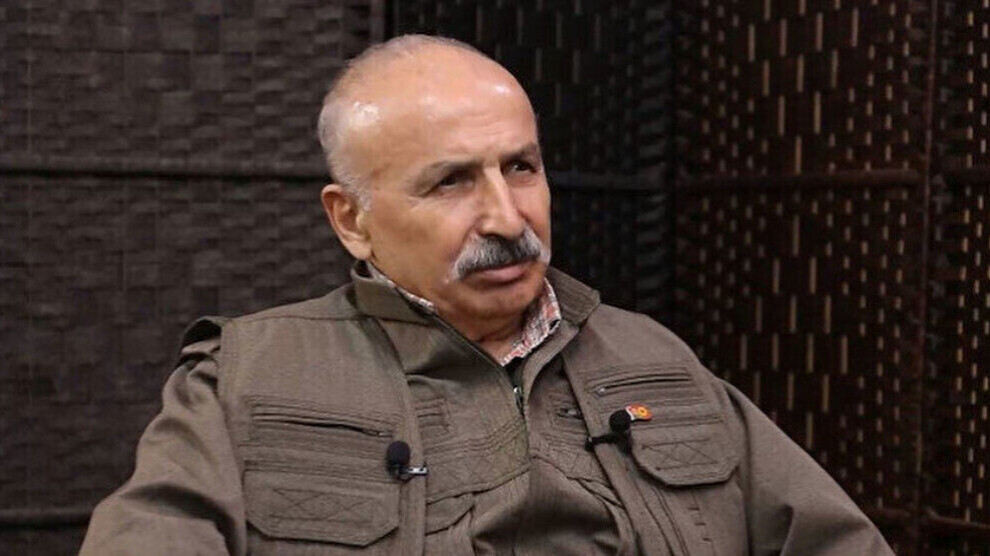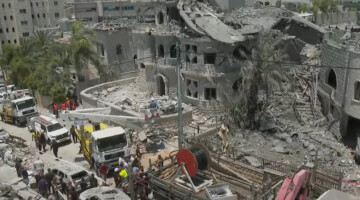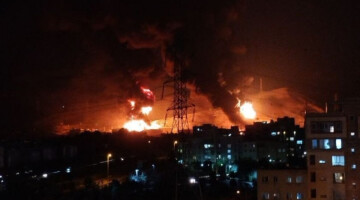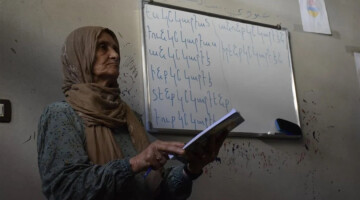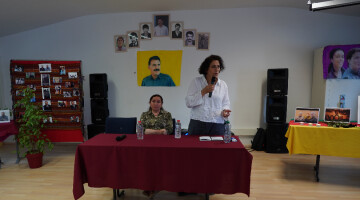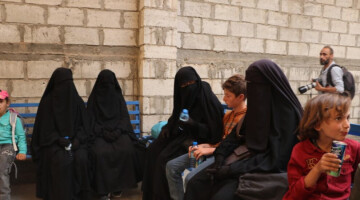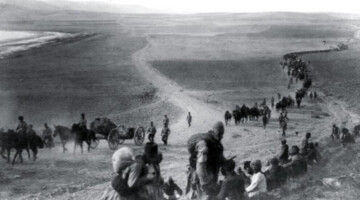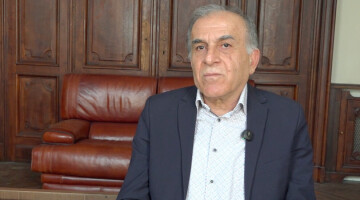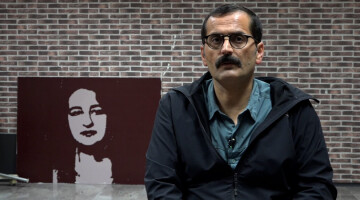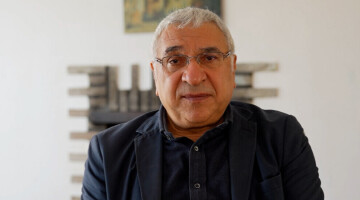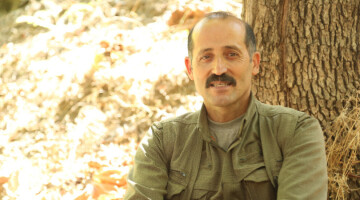In the second part of this interview, Mustafa Karasu, member of the KCK Executive Council, spoke about the approaching anniversary of the Yazidi genocide, the 100th anniversary of the Treaty of Lausanne, and the importance of Kurdish national unity.
The first part of this interview can be read here
In a few days, it will be the anniversary of the genocide against the Yazidis. What would you like to say on this occasion? And what are the perspectives of Yazidi society today?
Nine years ago, one of the most brutal crimes in history was carried out in Şengal. They tried to completely wipe out the Ezidi society. But this was prevented in the last second by the HPG guerrilla forces. Separating a people from its own geography constitutes a genocide. Every culture flourishes on its own soil. Every flower gives its most beautiful color and fragrance when it grows on its own soil. The group of guerrillas that came to Şengal was a really small group, but they immediately started to resist against the genocidal ISIS fighters. Later, the YPG and YPJ fighters arrived and managed to open a corridor for the civilians to escape. Thus, the Ezidi society was saved from this genocide. They still remember this very well. What many do not know is that Rêber Apo had already warned of the arrival of IS and called for the protection of the Ezidi society. This was an order given directly by Rêber Apo and fulfilled by the HPG and YJA Star guerrillas, as well as the fighters of the YPG and YPJ.
Today, the Yazidis continue to return to their homeland. After all they have experienced, this people needs to be allowed to be free and autonomous. So many different identities and cultures in the world have shown that you can only protect your existence and freedom through autonomy and self-administration. In this respect, on this anniversary of the genocide perpetrated against the Ezidi society by IS, all the peoples of the world and all the forces of democracy and humanity must support the struggle of the Ezidi society for freedom, democracy and its very existence. The best way to express your love for the Yazidi society is to accept its self-administration. Otherwise, they will hardly be able to survive. Especially under the conditions of capitalist modernity, cultures, identities and beliefs can only survive through self-administration. Otherwise, in the age of capitalist modernity and the nation-state, the fate of all identities and beliefs is genocide.
The 100th anniversary of the Treaty of Lausanne is just a few days away. It was a historic day whose effects are still being felt today. Can you tell us more about the background of this treaty?
The Treaty of Lausanne has had a huge impact not only on Kurdish society, but also on all the peoples of the Middle East. This treaty is the basis for a genocide. In fact, two congresses were held in the [North Kurdish/East Turkish] cities of Erzurum and Sivas before it was signed in Lausanne. As a result of them, the Misak-ı Milli [National Pact] was declared, i.e. the goal to establish one homeland and one government together as Turks and Kurds. The Kurds supported this goal to establish a free and independent country. But what happened later? While the existence of the Kurdish people was acknowledged in the constitution of 1921, they started to deny it with the declaration of the new constitution in 1924. This denial is based on the Treaty of Lausanne.
This treaty is basically about the following: The British demanded the Turkish state to leave Mosul and Kirkuk to them. In return, they promised to allow the Turkish state to carry out a genocide against the Kurds within its own borders. Both the Turkish state as a whole and the Kemalist government in particular accepted this. In other words, Lausanne is a Kurdish genocide agreement.
The British and the French state are just as responsible for this as the United Nations. The Turkish government obtained the right to carry out a genocide against the Kurds with the approval of these states by leaving Mosul and Kirkuk. The nation-state created by capitalist modernity is in itself a tool of genocide. Not only in this region. If we look at history, we will see that many different people and cultures have been subjected to genocide with this tool.
In this respect, it is not only the Treaty of Lausanne and the policy of genocide that must be opposed, but rather the nation state itself. The mentality that is created by the nation state leads to genocide. The Turkish will to create their own nation state has lead to genocide against the Kurdish society. The same goes for the Persians and the Arabs who established their own nation states based on cultural genocide. But the Turkish state is the most concrete example.
The Turkish state received the right to carry out a genocide against the Kurds in Lausanne. And as if this were not enough, it now wants to turn the entire Kurdish geography, which it calls Misak-ı Milli, into the expansion area of Turkish nationhood by crushing the Kurdish Freedom Movement. It wants to take Rojava and South Kurdistan under its hegemony and establish Turkish nationhood there too. All this can not be seen as independent of the Treaty of Lausanne.
A few days ago, a conference was held in Lausanne on the centenary of the signing of the treaty. This is very important. Talks about Kurdish national unity took place in the city where Kurdistan was divided into four parts a hundred years ago. But when we talk about national unity, we need to be realistic. Talking about national unity without seeing the current situation of the KDP means not going any step further. Because this an essential topic. There is this perception that there cannot be national unity without the KDP. Obviously, it would be best if the KDP joined the efforts of national unity, but they have shown that they do not want to. They want to dominate the whole nation and seize all the political power. There was a time when they wanted to talk. This was during the ceasefire of 2012 and 2013. After the ceasefire was declared and the war had stopped, the KDP came running to us and wanted to talk. But when Turkey broke the ceasefire and restarted, the KDP pulled back immediately. National unity is important. All Kurdish groups and parties should come together. Today, the KDP constitutes an obstacle to national unity.
The Treaty of Lausanne was signed and Kurdistan was divided. But there is still an opportunity to stop this genocide. This is not about creating an own Kurdish state. Much more than that, it is about the prevention of this ongoing genocide and the protection of Kurdish existence.
National unity will ensure Kurdish self-administration in all parts of Kurdistan. Important steps have been taken and a lot of progress has been made in this regard. There is significant progress in Rojava and South Kurdistan, but also in North and East Kurdistan the struggle of the Kurdish people is strong. The main achievement is that there is a strong acknowledgment of the Kurdish existence. The struggle being waged in the four parts of Kurdistan has made this possible.
Recently, there have again been a lot of discussions about the revolution in Rojava, both about the perspectives that have emerged from it and about problems in building structures for society. Have you been able to follow these discussions? What do you think about them?
First of all, the Rojava Revolution is a great revolution. In the Middle East, there are many essential problems and open questions regarding nation, faith, culture, women, democracy and much more. Through the Rojava Revolution, the right solutions have been found to all of these problems. In a way, it is not only a revolution that solves the Kurdish problem, but a revolution that puts forward a solution to the problems of the whole Middle East. There is the understanding of the democratic nation, of democracy, of different faiths living side by side and of women's freedom. This means leaving sectarian, national and power conflicts aside and obtaining rights as part of democracy instead of power struggles and of seeking a state. It is about solving problems without adapting a mentality of power. This is very important, because it is the mentality of the state and power that creates all problems and makes them unsolvable. The moment you enter into the sphere of state and power, you lose the ability to solve problems.
The people of Rojava have shown that they understand this well. It is the practical implementation of the perspective created by Rêber Apo. But I would also like to point out that the paradigm of Rêber Apo has still not been fully implemented in Rojava. Despite this, everyone has seen how important and valuable even this inadequate implementation is. In this respect, the Rojava Revolution is a field of freedom, a model in the environment of oppression and persecution in the Middle East. We believe that the Rojava Revolution and the Autonomous Administration of North and East Syria will be a model.
Can there be any other solution for a new Syria while all these gangs and groups affiliated with Turkey try to gain power in the country? No, there can’t. Can stability be achieved in Syria without changing the current regime's understanding? No. The only common denominator for the stabilization of Syria are the social and political principles put forward by the Autonomous Administration of North and East Syria. The leadership of North and East Syria is capable of reaching a compromise. But how can you achieve reconciliation with gangs, with groups that are under the influence of Turkey? Unless the regime changes itself, it cannot provide stability and a solution, and a compromise will not be possible.
On the other hand, the Rojava Revolution has played an important role in uniting the democratic forces of the Middle East. It has created an Arab-Kurdish alliance in Syria against the Turkish state’s aggression. These are really important developments, not only for Syria but for the whole Middle East. I would therefore like to salute this revolution. We believe that the Kurds, Arabs, Assyrians and Circassians will protect this revolution against all kinds of attacks on the basis of the idea of a democratic nation. This revolution is a very beautiful revolution, although it may have its shortcomings. The existing problems stem from the fact that the paradigm of Rêber Apo has not been fully implemented. But even in its current state, it is a revolution that has the support of all peoples and will be an example for the Middle East. I therefore respectfully salute all those who have contributed to this revolution.
Recently, a NATO summit took place in Vilnius, where it was announced that Turkey gave the green light for Sweden to join the alliance. In this context, the interests of the Turkish state in terms of foreign policy were discussed intensively. How do you evaluate Turkey's alliance policy?
Kurds in all four parts of Kurdistan are faced with the threat of genocide. To finalize the genocide, Turkey uses every opportunity to blackmail the international powers. They do this with refugees, their NATO membership and their relations with Russia. The Turkish state and government functions work based on this mentality of blackmailing. It is not a democratic country at all. It persecutes the Kurds. When they ask the European Union (EU), which calls itself democratic all the time, for help in their genocide policy, the EU immediately complies. The stance of the EU is really hypocritical and shameless. No state should negotiate with Turkey and use the struggle of the Kurdish people for freedom as a bargaining chip.
What exactly does the Turkish state do now? Allegedly, Sweden and some other countries were not willing to give Turkey certain weapons, because they said that the Turkish army would misuse them and turn them against the Kurds.
They said that Turkey was not using these weapons in the right way and that it was using them against the Kurds instead. But now they are saying that they will sell these weapons to Turkey. This has always been the main aim of the Turkish state. Then there is also the demand of Turkey to have a number of Kurds handed over to them. Turkey is using pressure to achieve this. But the basic goal of Turkey is to get political support for the genocide. That is what they want these weapons for and NATO is willing to provide them.
The Turkish state forms all kinds of alliances, relations, institutions, e.g. NATO and the EU. The only reason is to carry out the Kurdish genocide. It forms these alliances in order to get support for the Kurdish genocide. If these alliances demand them to stop the genocide, Turkey would not stay in them for a second.
Now the Turkish state is again trying to become a member of the EU. This is not because they really want to enter. They only want the benefits of EU membership. They will try to get them after they finalize the Kurdish genocide. Turkey will not seriously try to enter the EU until the Kurdish genocide is not completed. Because the EU has its own criteria, measures, the local autonomy charter, etc.. When Turkey becomes a member of the EU, it has to give up its Kurdish genocide policy. But it only wants to use the EU for the Kurdish genocide. At the moment, Turkey has no interest in joining the EU. That is a fact no one should deceive themselves about.
In this respect, both NATO and the EU have become institutions that the Turkish state uses for the Kurdish question. As Kurds, we would like to warn these institutions not to support this genocide. They say that they understand the sensitivity of the Turkish state, but I want to ask them where their sensitivity is while Rojava is being bombed every day; where their sensitivity is regarding all the Kurdish political prisoners in Turkey.
In short, the recent NATO summit was a really shameful meeting. Negotiations between the Kurds and the PKK took place there without the Kurds being involved. In this respect, all Kurds really need to take a stance against NATO and against this attitude of the EU. NATO and the EU should not be partners in the Kurdish genocide, but they currently are. Just like they were partners in the past in the Armenian genocide. The policies and conflicts of that period led to the Armenian genocide. Now, they are becoming complicit in the genocide of the Kurds. They need to give this up as soon as possible.

